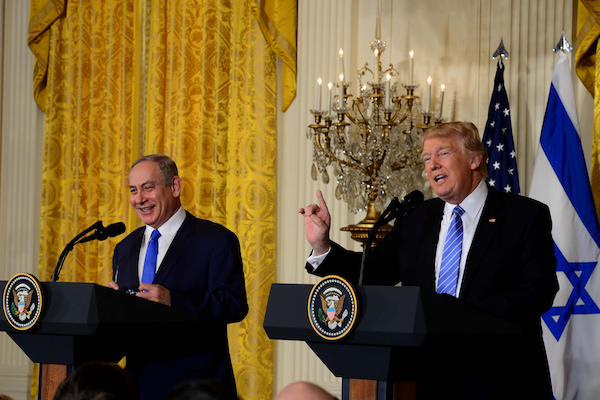The American president shocked many with his willingness to abandon the two-state paradigm. But that wasn’t the radical part of his message to Netanyahu and Israelis.

“I’m looking at two-state and one-state and I like the one that both parties like. I’m very happy with the one that both parties like.” Ever since President Donald Trump uttered that surprising sentence at a joint press conference with Israeli Prime Minister Benjamin Netanyahu at the White House on Wednesday, commentators and politicians alike have been trying to analyze and understand what exactly he meant and what it might mean.
In Israel, Thursday morning’s headlines focused on the first part of the sentence. It was the first time in many years that an American president raised the idea of an alternative to the two-state solution — and not as a warning but rather as a possibility. The two-state solution, after all, is the only solution that has been accepted by the international community, and at least formally, by most Israelis and Palestinians.
From and Israeli perspective, however, the radical part of Trump’s message was in the second sentence.
The current Israeli political discourse, after all, tends to have one common denominator. In one corner you have the retired generals who advocate a unilateral “separation” from the Palestinians. Then you have the far-right and the likes of Naftali Bennett promoting various iterations of unilateral annexation. Netanyahu simply wants to maintain a lopsided status quo. All of those share a common point of departure: maintaining Jewish supremacy in Israel-Palestine, but more importantly, preserving Israel’s exclusive right to decide and define the resolution of the Palestinian conflict.
In Trump’s view, at least according to what he said Wednesday night (which, as we know, does not necessarily have any relation to his views Thursday morning), the desired outcome to the conflict is one that is acceptable to both sides. That doesn’t mean withdrawing to the borders Israelis want on Israeli terms. It doesn’t mean unilaterally annexing parts of the West Bank. It means an agreement.
I don’t have any illusions about Donald Trump. I am not counting on a misogynistic, racist real estate mogul to save us from ourselves. We cannot pin our hopes on anyone coming to save us. But the fact that even the United States president, on whom the Israeli Right has pinned its hopes, stated that any agreement must be acceptable to both sides is worth praising. This is an approach that, unfortunately, has been missing from the political discourse in Israel, and Trump is right to try and bring it back to center stage.
The discussion over one state or two states is an important one. But today we must admit that we live in one giant state that has been ruled by Israel for the past 50 years, or at the very least two states, with Gaza and Area A of the West Bank surrounded by Israel. However you look at it, the present situation is designed to maintain Jewish supremacy across the land, while Palestinians in different areas live under a different regimes (inside Israel, in East Jerusalem, in Areas A, B and C, and in Gaza), without allowing Palestinians a stake in determining their own fate.
If we adopt the spirit of Trump’s words, then the most important question of all is that of partnership, consent, and the equal right for all inhabitants of this small land to make decisions about our future. And with all due respect to the wonderful budding relationship and chemistry between the two leaders, that is the last thing Netanyahu is interested in.
This article was first published in Hebrew on Local Call. Read it here.

